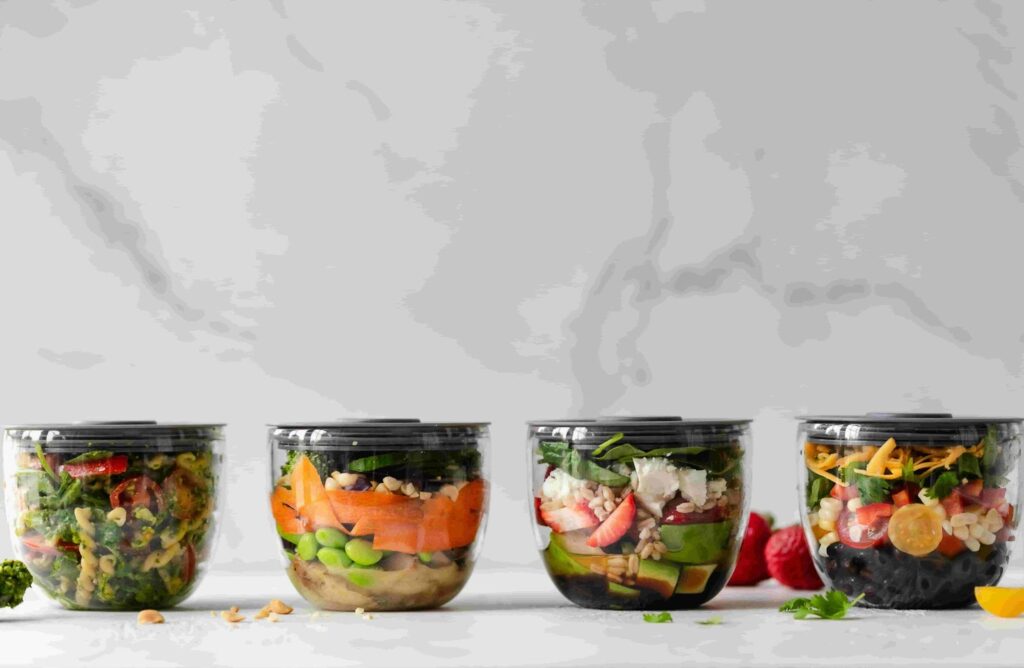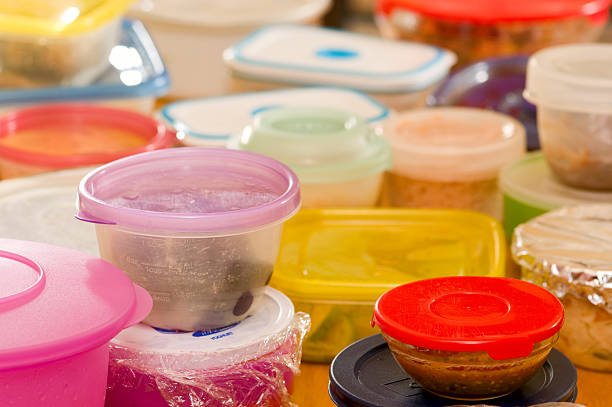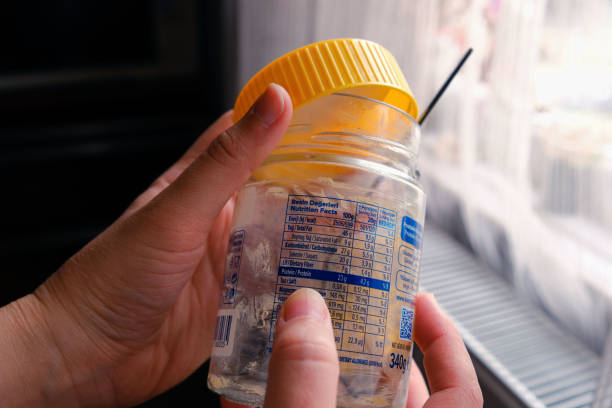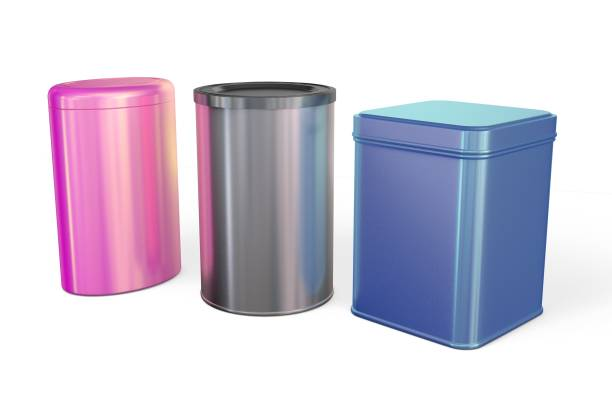Food storage plays a crucial role in maintaining freshness, preventing spoilage, and ensuring food safety. With the growing need for efficient and long-term food preservation, airtight food storage containers have become a preferred choice for households and businesses.
These containers help protect food from air, moisture, pests, et les bactéries, ensuring longer shelf life and better quality.
Dans cet article, we will discuss:
The benefits of airtight containers
Whether food can still go bad in sealed containers
The potential for bacterial growth inside airtight cans
Best practices on how to store food for long-term storage
What Are the Advantages of Airtight Containers?

Using airtight food storage canisters offers numerous benefits, from keeping food fresh to reducing waste and protecting against contaminants. Here’s why they are considered the best containers for food storage:
Extends Food Shelf Life
Airtight containers slow down oxidation and moisture loss, which are the primary causes of food spoilage. When food is exposed to air, it changes texture, flavor, and nutrient composition. Sealing food in airtight cans prevents these effects, allowing items like grains, coffee, and spices to retain their freshness for months or even years.
Prevents Contamination and Bacterial Growth
One of the biggest concerns in food storage is contamination from bacteria, mold, and pests. Airtight containers act as a protective barrier, ensuring that your food remains safe and hygienic. This is especially useful for:
- Dry foods like flour, sugar, and pasta that attract insects
- Perishables like cheese and cold cuts that are prone to bacterial growth
- Bulk food storage for businesses and households preparing for emergencies
Reduces Food Waste & Saves Money
Every year, millions of tons of food are wasted due to improper storage. By using airtight containers, you can reduce food waste and save money by keeping groceries fresh for longer.
According to the FAO (Food and Agriculture Organization), roughly 1.3 billion tons of food is wasted annually, costing the global economy over $1 trillion. Investing in proper food storage methods, such as airtight cans, can significantly reduce unnecessary waste.
Maintains Nutritional Value & Flavor
Nutrients like vitamin C, antioxidants, and healthy fats degrade quickly when exposed to air. Airtight containers preserve essential nutrients while also locking in flavors. This is particularly beneficial for:
- Spices and herbs that lose potency when exposed to air
- Coffee beans that become stale when oxidized
- Dried fruits and nuts that can turn rancid if not stored properly
Eco-Friendly and Sustainable Option
Unlike single-use plastic packaging, many airtight cans are made from recyclable materials like tinplate, glass, and BPA-free plastic. Investing in durable, reusable containers helps reduce plastic pollution and supports a more sustainable lifestyle.
Does Food Go Bad in a Sealed Container?

Even though airtight storage greatly reduces spoilage, food can still go bad under certain conditions. Here are the main factors affecting food longevity in airtight containers:
Type of Food Matters
- Perishable Foods
Meat, dairy, and fresh vegetables will still spoil, even in airtight storage, unless refrigerated or frozen.
- Dry & Processed Foods
Flour, sugar, pasta, and snacks last much longer in airtight cans, especially when stored properly.
- Canned & Preserved Foods
Items like pickles and sauces have extended shelf life due to airtight sealing and preservatives.
Storage Temperature is Key
Keeping airtight cans in a cool, dark place (like a pantry or refrigerator) helps prevent food from spoiling. Exposure to heat and humidity accelerates food degradation, even in sealed containers.
Expiration & Pre-Storage Condition
- If food is already close to expiring, airtight storage won’t reverse spoilage.
- Always check for mold, foul smells, and discoloration before sealing food in containers.
🔹 Key Takeaway: Airtight storage can slow down spoilage, but food can still go bad due to temperature, moisture, and pre-existing contamination.
Can Bacteria Grow in Airtight Sealed Food Containers?

Oui, certain types of bacteria can still grow inside airtight food containers. Here’s what you need to know:
Some Bacteria Thrive Without Oxygen
While most bacteria need oxygen to grow, anaerobic bacteria like Clostridium botulinum (which causes botulism) can survive in sealed environments if moisture and warmth are present.
Proper Storage Prevents Growth
- Store food at cold temperatures to prevent bacterial growth.
- Keep moist foods refrigerated to avoid spoilage.
- Use high-acid or dry foods for safer long-term storage.
For more details on the risks and benefits of airtight food storage, check out this TM Tin Box article.
How to Store Food for Long-Term Storage
Here are the best practices for how to store food for long-term storage using airtight containers:
- Use Dry, Clean Containers – Always sanitize and dry containers before use.
- Store in a Cool, Dark Place – Prevents heat and light from accelerating spoilage.
- Label & Rotate Stock – Use the FIFO method (First In, First Out) to maintain freshness.
- Check for Damage – Discard any containers with dents, cracks, or swelling.
Conclusion
Airtight food storage containers are one of the best containers for food storage, offering superior protection, longer shelf life, and contamination prevention. Cependant, proper storage practices are essential for maintaining food safety.
By following the right storage methods and using high-quality airtight food storage canisters, you can significantly reduce food waste, save money, and ensure fresher, healthier meals for yourself and your family.
FAQ
Where can I buy good quality airtight tin cans?
In TMTINBOX, make your brand pop out and gain more profit easily with eye-catching tin boxes. Profitez d'un séjour sans stress, solution globale.
Whether you need customization or festive tin cans of different shapes to hold food or other items, we have a professional team to communicate and solve it for you.
Why keeping food in an airtight container helps in preventing rancidity?
Storing food in airtight containers helps prevent rancidity by blocking air (oxygen) from coming into contact with the food. This prevents oxidation, ensuring that the food retains its original taste and aroma without becoming rancid.
Do food storage containers need to be airtight?
And perhaps one of the biggest benefits is the fact that limiting exposure to air helps retain the nutritional value of the food. In essence, airtight containers help in keeping your food safe, fresh, and of high quality for longer periods.














